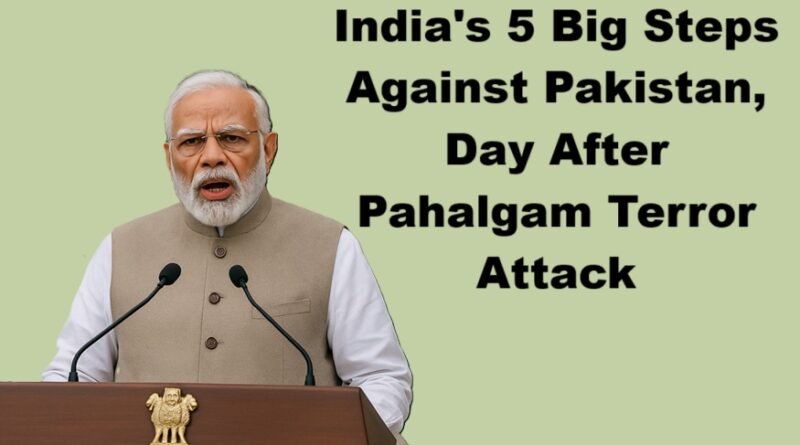India’s 5 Big Steps Against Pakistan, Day After Pahalgam Terror Attack
April 23, 2025 | New Delhi — In the wake of a brutal terror strike in Pahalgam that claimed the lives of 26 innocent civilians, India has initiated a comprehensive set of retaliatory measures targeting its ties with Pakistan. The decisions, taken during an emergency session of the Cabinet Committee on Security (CCS) chaired by Prime Minister Narendra Modi, reflect a significant escalation in India’s posture following yet another provocation from across the border.
The move comes amidst growing domestic outrage and international concern over Pakistan’s persistent harboring of terror networks operating against Indian interests.
1. Indus Waters Treaty Suspended
India has decided to suspend the Indus Waters Treaty of 1960, marking an unprecedented shift in a decades-old water-sharing framework that has long been seen as a rare symbol of cooperation between the two adversaries. The treaty, facilitated by the World Bank, governs the use of six rivers flowing from India into Pakistan.
The government stated that the treaty would remain in abeyance until Islamabad demonstrates concrete, irreversible steps to dismantle terror infrastructure within its territory.
2. Attari-Wagah Border Sealed
The government has ordered the immediate closure of the Attari-Wagah Integrated Check Post, the most prominent land route for travel and limited trade between the two nations.
Pakistani nationals who entered India with valid endorsements prior to this directive are allowed to exit via the same route until May 1, 2025, after which the crossing will remain sealed indefinitely. The closure is expected to impact pilgrimages, diplomatic travel, and bilateral trade at a ground level.
3. SAARC Visa Exemptions Withdrawn
In a move signaling India’s recalibration of regional diplomatic ties, Pakistani nationals will no longer be eligible to travel under the SAARC Visa Exemption Scheme (SVES). All previously issued SVES documents have been declared null and void.
Furthermore, any Pakistani citizen currently within India under this program has been directed to leave the country within 48 hours, a strict deadline indicative of the serious security posture adopted by the Indian government.
4. Expulsion of Military Attachés
India has expelled the Defence, Naval, and Air Advisors posted at the Pakistani High Commission in New Delhi, declaring them persona non grata and mandating their departure within seven days. In a reciprocal measure, India will also be withdrawing its own military attachés from the Indian High Commission in Islamabad.
Additionally, five support staff members from each side’s military representation will be recalled, bringing an abrupt halt to military-to-military diplomatic liaison mechanisms that traditionally served as communication channels during heightened tensions.
5. Downsizing of Diplomatic Missions
In a final step aimed at reducing engagement to the bare minimum, both countries will slash the strength of their diplomatic missions from 55 to 30 personnel by May 1, 2025. This staff cutback is intended to streamline diplomatic interactions amid deteriorating bilateral relations.
This decision underscores the government’s resolve to limit formal interactions to essential consular affairs while re-evaluating all other areas of engagement.
Context: The Pahalgam Attack
The terror attack in Pahalgam, Jammu & Kashmir, targeted a bus carrying tourists and pilgrims. The coordinated strike, carried out using automatic weapons and improvised explosive devices (IEDs), is believed to be the handiwork of Lashkar-e-Taiba (LeT), a Pakistan-based terror organization.
Indian intelligence has traced logistical support and communications back to handlers based in Pakistan, reinforcing long-standing allegations of state complicity or tacit tolerance in such operations.
International Reactions and Outlook
The Indian government has briefed key global stakeholders, including the United States, European Union, and members of the United Nations Security Council, on the gravity of the situation. While several nations have expressed solidarity with India’s right to defend itself, there is also rising concern over the implications of these actions for regional peace and security.
Diplomatic sources indicate that backchannels remain open, but India’s actions mark a clear shift from strategic patience to proactive deterrence.
Implications and the Road Ahead
India’s response, viewed as one of the most comprehensive diplomatic crackdowns in recent decades, sends a strong signal to Islamabad and the international community. It also reflects a growing domestic consensus that dialogue without action has yielded little in the fight against terrorism.
While the door for future normalization remains theoretically open, the path appears increasingly narrow. Unless Pakistan demonstrates verifiable commitment to dismantling its terror networks, experts believe that bilateral ties will remain frozen in deep distrust.
📌 Conclusion
The Indian government’s latest measures are not merely symbolic — they represent a decisive turn in the nation’s foreign policy doctrine. The emphasis is now on accountability, deterrence, and zero tolerance for terrorism in any form.
As the situation continues to evolve, all eyes remain fixed on the subcontinent. What follows could either be a phase of intense diplomatic isolation for Pakistan or a catalyst for long-overdue introspection in Islamabad. For now, India has made its position unmistakably clear: terrorism and diplomacy cannot coexist.

